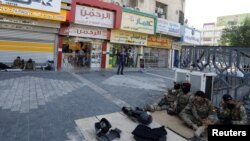ພວກເຈົ້າໜ້າທີ່ອີຣັກໄດ້ຍົກເລີກລະບຽບການຫ້າມອອກເຮືອນໃນນະຄອນແບັກແດດ, ແລະຈຳນວນຄົນເສຍຊີວິດໄດ້ເພີ້ມຂຶ້ນເຖິງ 72 ຄົນໃນສະພາບການວຸ້ນງາຍທີ່ແກ່ຍາວເປັນຫລາຍມື້ນັ້ນ.
ອີງຕາມອົງການຂ່າວຣອຍເຕີ ໃນວັນເສົາມື້ນີ້ ບັນດາເຈົ້າໜ້າທີ່ອີຣັກໄດ້ຍົກເລີກລະບຽບຫ້າມອອກບ້ານເຮືອນ ຢູ່ໃນນະຄອນແບັກແດດທີ່ພວກປະທ້ວງຕ້ານລັດຖະບານບໍ່ໄດ້ສົນໃຈນັ້ນ ໃນຂະນະທີ່ຈຳນວນຄົນເສຍຊີວິດໄດ້ເພີ້ມສູງຂຶ້ນເຖິງ 72 ຄົນ ຢູ່ໃນສະພາບການໂກລະຫົນວຸ້ນວາຍທີ່ແກ່ຍາວມາໄດ້ສີ່ມື້ແລ້ວນັ້ນ.
ການສັນຈອນໄປມາຢູ່ໃນທົ່ວນະຄອນຫລວງ ແລະຢູ່ຕາມຖະໜົນຫົນທາງຕ່າງໆ, ແລະໃນຈະຕຸລັດທີ່ສຳຄັນ ທີ່ໃນເມື່ອກ່ອນເຄີຍມິດງຽບໄປ ໄດ້ເປັນໄປຢ່າງປົກກະຕິ. ແທ່ງຊີມັງຄອນກຣີດໄດ້ເອົາມາໃຊ້ຕັນຢູ່ໃນເຂດທີ່ພວກປະທ້ວງຫລາຍພັນຄົນປະທະກັບຕຳຫລວດ ໃນອາທິດນີ້.
ຄະນະຂ້າຫລວງໃຫຍ່ດ້ານປົກປ້ອງສິດທິມະນຸດທີ່ເປັນອົງການເຄິ່ງທາງການ ຂອງອີຣັກເວົ້າວ່າ ກຳລັງຮັກສາຄວາມສະຫງົບໄດ້ກັກຂັງຄົນຫລາຍຮ້ອຍຄົນທີ່ເດີນຂະບວນປະທ້ວງ ແຕ່ວ່າຈາກນັ້ນກໍປ່ອຍເຂົາເຈົ້າໄປເກືອບໝົດທຸກຄົນ.
ຕຳຫລວດທີ່ດັກຢູ່ໄດ້ຈອບຍິງພວກປະທ້ວງໃນວັນສຸກວານນີ້ ຊຶ່ງເປັນຍຸດທະວິທີໃນການກໍ່ຄວາມຮຸນແຮງເພີ້ມຂຶ້ນ ທີ່ກຳລັງຮັກສາຄວາມສະຫງົບໃຊ້ ທີ່ໄດ້ລວມທັງການຍິງກະສຸນປືນແທ້, ແກັສນ້ຳຕາ ແລະບັ້ງສີດຢ່າງແຮງ, ອີງຕາມອົງການຂ່າວຣອຍເຕີ.
ກຳລັງຮັກສາຄວາມສະຫງົບໄດ້ກ່າວຫາວ່າມີພວກມືປືນລີ້ຊ່ອນປົນຢູ່ກັບພວກເດີນຂະບວນປະທ້ວງນັ້ນເພື່ອຍິງປືນໃສ່ຕຳຫລວດ. ຕຳຫລວດຫລາຍຄົນໄດ້ເສຍຊີວິດໄປ.
ການປະທ້ວງແມ່ນເພື່ອຄັດຄ້ານຕໍ່ການແບ່ງປັນວຽກງານທີ່ບໍ່ຍຸຕິທຳ, ການຂາດການບໍລິການ ແລະການສໍ້ລາດບັງຫລວງໃນວົງການລັດຖະບານ ທີ່ເກີດຂຶ້ນໃນວັນອັງຄານຜ່ານມາຢູ່ໃນນະຄອນຫລວງແບັກແດດ ແລະໄດ້ແຜ່ລາມອອກໄປຕົວເມືອງອື່ນໆຢ່າງໄວວາ, ຊຶ່ງສ່ວນໃຫຍ່ແມ່ນຢູ່ໃນເຂດພາກໃຕ້ຂອງປະເທດ.
ມັນເປັນສະພາບການວຸ້ນວາຍທີ່ສຸດຢ່າງບໍ່ເຄີຍມີມາກ່ອນຢູ່ໃນອີຣັກ ນັບແຕ່ປະເທດດັ່ງກ່າວໄດ້ປະກາດວ່າໄດ້ຮັບໄຊຊະນະໃນການສູ້ກັບກຸ່ມລັດອິສລາມໃນປີ 2017 ເປັນຕົ້ນມາ ແລະໄດ້ເຮັດໃຫ້ລັດຖະບານຂອງປະທານາທິບໍດີອາແດລ ອັບດຸລ ມາດີ (Adel Abdul Mahdi) ທີ່ປົກຄອງປະເທດມາໄດ້ນຶ່ງປີນັ້ນ ຖືກສັ່ນຄອນ.
ລັດຖະບານໄດ້ຕອບໂຕ້ຕໍ່ການປະທ້ວງດ້ວຍຄຳໝັ້ນສັນຍາວ່າຈະປະຕິຮູບແບບບໍ່ຈະແຈ້ງ ທີ່ບໍ່ມີທ່າທີ່ວ່າຈະເຮັດໃຫ້ອີຣັກມີຄວາມສະຫງົບລົງໄດ້ແຕ່ຢ່າງໃດເລີຍ.
ອ່ານຂ່າວນີ້ເພີ້ມເປັນພາສາອັງກິດ
Iraqi authorities lift Baghdad curfew; death toll rises to 72 in days of unrest
BAGHDAD, Oct 5 (Reuters) - Iraqi authorities lifted a days-long curfew in Baghdad on Saturday that anti-government protesters had defied, as the toll from four days of violent unrest rose to 72 killed and hundreds injured.
Traffic ran as normal through the Iraqi capital and streets and main squares were otherwise quiet. Concrete barriers blocked off areas where protesters in their thousands clashed with police during the week.
Iraq's semi-official High Commission for Human Rights said security forces had detained hundreds of people for demonstrating but then let most of them go.
Police snipers shot at protesters on Friday, Reuters reporters said, escalating violent tactics used by the security forces that have included live fire, tear gas and water cannons.
The security forces have accused gunmen of hiding among demonstrators to shoot at police. Several policeman have died.
The protests over unfair distribution of jobs, lack of services and government corruption erupted on Tuesday in Baghdad and quickly spread to other Iraqi cities, mainly in the south.
It is the deadliest unrest Iraq has seen since the declared defeat of Islamic State in 2017 and has shaken the year-old government of Prime Minister Adel Abdul Mahdi.
The government has responded with vague reform promises that are unlikely to placate Iraqis.
Powerful Iraqi cleric Moqtada al-Sadr, who has a mass popular following and controls a large chunk of parliament, demanded on Friday that the government resign and snap elections be held. At least one other major parliamentary grouping allied itself with Sadr against the government.
Parliament was set to meet on Saturday to discuss protesters' demands. Sadr's bloc has said it will boycott the session.




